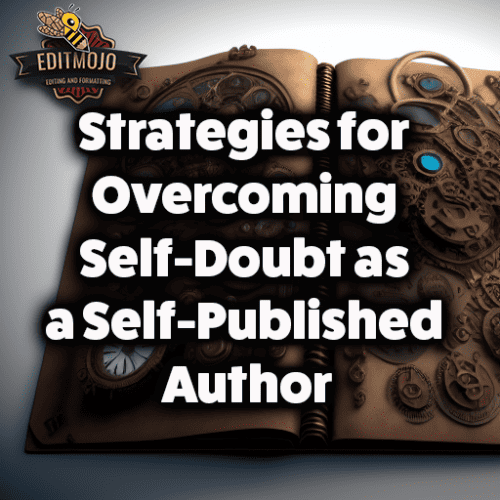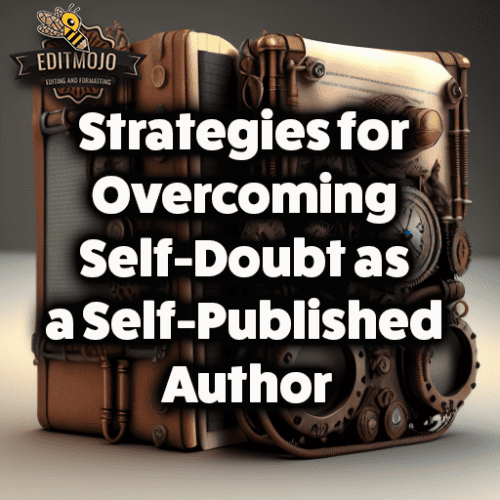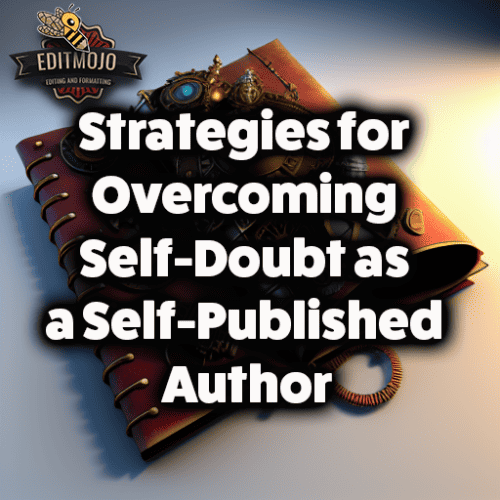Strategies for overcoming self-doubt as a self-published author
Strategies for Overcoming Self-Doubt as a Self-Published Author. Writing can be a lonely endeavor, and for self-published authors, it can sometimes feel like walking a tightrope without a safety net. Self-doubt is a frequent visitor in our creative minds, often second-guessing every sentence we type. But as daunting as this may sound, you’re not alone.
Key Takeaways Table
| Topic | Key Takeaways |
|---|---|
| Understanding Self-Doubt | Self-doubt is common in the creative process, including self-publishing. It often relates to Impostor Syndrome, where individuals doubt their accomplishments. |
| Impact of Self-Doubt | Self-doubt can affect both your writing process and your marketing efforts, hindering your success as a self-published author. |
| Overcoming Self-Doubt with CBT | Cognitive Behavioral Therapy (CBT) techniques can be helpful, such as identifying and challenging negative self-talk, visualization techniques, and positive affirmations. |
| Building a Support System | Joining writing communities, critique groups, and finding mentors can provide support and valuable feedback. |
| Importance of Self-Care | Mindfulness, meditation, relaxation exercises, and self-care routines are vital for mental wellbeing and can help manage self-doubt. |
| Continuous Learning and Skill Building | Improving your craft through workshops, courses, and continuous learning can boost confidence. |
| Successful Author Case Studies | Success stories of authors like Hugh Howey demonstrate that self-doubt can be overcome. |
| Tools and Resources | Books, podcasts, and online resources provide guidance and insights for combating self-doubt. |
Understanding Self-Doubt
What is Self-Doubt?
Self-doubt is that nagging voice in your head that questions your abilities. It’s the internal whisper that asks, “Am I good enough? Can I really pull this off?” In the world of self-publishing, where the journey from first draft to published book largely depends on your efforts, it can be a paralyzing force.

Many successful self-published authors have confessed to experiencing self-doubt at some point. In her book “Big Magic“, Elizabeth Gilbert openly talks about her struggles with self-doubt and offers encouraging insights on how to overcome them.
Understanding that self-doubt is a part of the creative process can be incredibly liberating. It’s not unique to you. It’s a shared experience that even the most successful writers confront.
The Psychology of Self-Doubt
Psychologically, self-doubt is often tied to Impostor Syndrome, a term coined by psychologists Pauline Clance and Suzanne Imes. It refers to the feeling that despite evident success or competence, one believes they are deceiving others into thinking they are more intelligent or capable than they truly are.
The Impacts of Self-Doubt
Self-doubt can seep into your creative process, making you question every word you write. You may find yourself rewriting a single paragraph multiple times, only to delete it all in the end.
But the influence of self-doubt extends beyond writing. It may hinder your marketing efforts too. You might feel shy about promoting your book, fearing negative critiques, or struggling to convince others about your work’s value when you’re doubting it yourself.
Strategies for Overcoming Self-Doubt
So, how do we overcome self-doubt? Here are some proven strategies.

Cognitive Behavioral Techniques
Cognitive Behavioral Therapy (CBT) techniques can be particularly helpful. The first step is to identify your negative self-talk. Pay attention to the times when you’re telling yourself you can’t write, you’re not good enough, or people won’t like your work. Once you’ve identified these negative thoughts, challenge them. Ask yourself, “Is this really true?” More often than not, you’ll find that these thoughts aren’t based in reality, but are unfounded fears.
Visualization techniques and positive affirmations can also be beneficial. Picture yourself as a successful self-published author. Imagine your book cover, the positive reviews, and the readers who will benefit from your words. Then, create a positive affirmation, such as, “I am a talented author, and my story is worth telling.” Repeat this affirmation daily.
Developing a Strong Support System
Having a strong support system is also crucial. Connecting with writing communities and critique groups can provide you with valuable feedback and a sense of camaraderie. Services like Meetup or platforms like Reddit’s r/Writing can be great places to find such communities.
Don’t underestimate the role
of mentors or coaches, either. They can provide guidance, reassurance, and constructive criticism, helping you grow as a writer.
Mindfulness and Self-Care
As a writer, taking care of your mental health is essential. Techniques such as mindfulness, meditation, and relaxation exercises can help manage stress and reduce feelings of self-doubt.
Incorporate self-care into your routine. This could mean taking a walk after a writing session, enjoying a warm bath at the end of the day, or indulging in your favorite hobby during your downtime. Your mental wellbeing plays a significant role in your writing journey, so be sure to nurture it.
The Power of Continued Learning and Skill Building
Continuing to learn and improve your writing skills can also boost your confidence. Consider participating in writing workshops or taking online courses on self-publishing. Platforms like MasterClass or Coursera offer classes from accomplished authors that can provide valuable insights.

Case Studies: Successful Authors Who Overcame Self-Doubt
One excellent example of an author who battled and overcame self-doubt is Hugh Howey, the self-published author of the successful “Wool” series. Howey had to fight off self-doubt, especially since his genre of choice, science fiction, is often deemed ‘niche’. But he overcame his fears, published his work, and his series has since garnered international acclaim.
Tools and Resources for Overcoming Self-Doubt
A myriad of resources can help you combat self-doubt. Books such as “The War of Art” by Steven Pressfield or “Feel the Fear and Do It Anyway” by Susan Jeffers offer valuable insights. Podcasts like “The Creative Penn” offer advice on self-publishing and interviews with authors who share their experiences with self-doubt.
How to Maintain Confidence and Overcome Future Doubts
Maintaining confidence is an ongoing journey. Continuing to apply the strategies listed above can help, but also remember that it’s okay to have moments of self-doubt. What matters is not letting these moments stop you. Remember the words of Vincent Van Gogh, “If you hear a voice within you say ‘you cannot paint,’ then by all means paint, and that voice will be silenced.”
Conclusion (Strategies for Overcoming Self-Doubt as a Self-Published Author)
Self-doubt is a common part of the author’s journey, but it doesn’t have to paralyze you. With the strategies and resources discussed, you can take control of your self-doubt, build your confidence, and pave the way towards a successful self-publishing career.
Now, it’s your turn to implement these strategies, silence your doubts, and let your words flow freely onto the pages. Share your own experiences with overcoming self-doubt in the comments below. After all, we’re all in this together, navigating the tumultuous yet exhilarating seas of the written word.
Top Five Questions and Answers Table
| Question | Answer |
|---|---|
| What is self-doubt in the context of self-publishing? | Self-doubt in self-publishing refers to questioning your own writing abilities, the value of your story, and the potential success of your book. |
| How does self-doubt affect the writing and self-publishing process? | Self-doubt can make you question every word you write, hinder your creativity, and negatively impact your marketing and promotional efforts. |
| What are some strategies to overcome self-doubt? | Strategies include using Cognitive Behavioral Techniques, building a strong support system, practicing mindfulness and self-care, and continuously learning and improving your writing skills. |
| Are there any successful authors who have overcome self-doubt? | Yes, many successful authors have overcome self-doubt, including self-published authors like Hugh Howey, who has achieved international acclaim. |
| What resources are available to help combat self-doubt? | Resources include books such as “The War of Art” by Steven Pressfield, podcasts like “The Creative Penn,” and online platforms offering classes from accomplished authors. |
